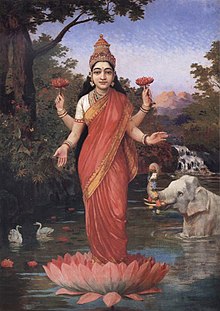When we talk about Diwali, we directly relate it to being call as the ‘Festival Of Lights’. True to what its known for – if you are in India or traveling to India during this festival season, you will love the glitter of light, the delicious sweets, the rangoli patterns(creative patterns made on the floor) made outside homes or temples and people geared up to celebrate this festival by lighting fire crackers.
Diwali is a festival that signifies the victory of good over evil. It generally falls around the month of October or November. You’ll notice people clean their homes and start decorating it a few weeks before Diwali. It’s a time when people shop for new clothes and buy gifts for their friends and family. It’s also the time when families tell their children stories, myths and legends about the battles between good and evil .
Diwali is a Hindu festival where people follow and worship one or more than one deity. The most common one being ‘Lakshmi’, the Goddess of Wealth and prosperity. On Diwali night people pray and light fireworks, later celebrating the night with their friends and family with food and sweets.
Spiritual significance (Source: best explained in Wikipedia)
Diwali is celebrated by Hindus, Jains, and Sikhs and some Buddhists[14] to mark different historical events, stories or myths but they all symbolise the victory of light over darkness, knowledge over ignorance, good over evil, hope over despair.[5][31][32]
The Yoga, Vedanta, and Samkhya schools of Hindu philosophy share the belief that there is something beyond the physical body and mind which is pure, infinite, and eternal, called the Atman. The celebration of Diwali as the “victory of good over evil” refers to the light of higher knowledge dispelling all ignorance, the ignorance that masks one’s true nature, not as the body, but as the unchanging, infinite, immanent and transcendent reality. With this awakening comes compassion and the awareness of the oneness of all things, and knowledge overcomes ignorance. Diwali is the celebration of this inner light over spiritual darkness,[33][34] knowledge over ignorance, right over wrong, good over evil.[35][36]
Hinduism
The religious significance of Deepavali varies regionally within India, depending on the school of Hindu philosophy, regional myths, legends, and beliefs.
Hindus across the world celebrate Diwali in honor of the return of Lord Rama, his wife Sita and his brother Lakshmana from exile of 14 years. As written in Valmiki‘s Ramayana, the night Lord Rama returned from exile on the Shukla Paksha day of Navami in the Hindu month of Chaitra month after defeating Ravana, it was Amavasya. To honor the return of Lord Rama, Sita and Lakshmana from Lanka and to illuminate their path, villagers light Diyas to celebrate the triumph of good over evil. [37] It is wrongly believed that Diwali celebrates the return of Pandavas after 12 years of Vanvas and one year of “Agyatavas” in Mahabharata. Furthermore, Deepavali is linked to the celebration of Lakshmi, who is venerated amongst Hindus as the goddess of wealth and prosperity and is the wife of Lord Vishnu. The 5-day festival of Diwali begins on the day Goddess Lakshmi was born from the churning of cosmic ocean of milk by the gods and the demons; while the night of Diwali is the day Lakshmi chose Vishnu as her husband and they were married.[17][38] Along with Lakshmi, devotees make offerings to Ganesha, who symbolizes ethical beginnings and fearless remover of obstacles; Saraswati, who embodies music, literature and learning and Kubera, who symbolizes book-keeping, treasury and wealth management.[17] Other Hindus believe that Diwali is the day Vishnu came back to Lakshmi and their abode in the Vaikuntha; so those who worship Lakshmi receive the benefit of her good mood, and therefore are blessed with mental, physical and material wellbeing during the year ahead.[39]
Hindus in India’s eastern region, such as Odisha and West Bengal, worship the goddess Kali instead of Lakshmi, and call the festival Kali Puja.[40][41] In India’s Braj and north central regions, the god Krishna is recognized. People mark Mount Govardhan, and celebrate legends about Krishna. In other regions, the feast of Govardhan Puja (or Annakoot) is celebrated, with 56 or 108 different cuisines prepared, offered to Krishna, then shared and celebrated by the local community.
In West and certain Northern parts of India, the festival of Diwali marks the start of a new Hindu year.
Sikhism
Diwali for Sikhs marks the Bandi Chhor Divas, when Guru Har Gobind freed himself and some Hindu Rajahs, from the Gwalior Fort, from the prison of the Mughal emperor,Jahangir, and arrived at the Golden Temple in Amritsar. Ever since then, Sikhs celebrate Bandi Choorh Divas, with the annual lighting up of Golden Temple, fireworks and other festivities. In the post-Guru Gobind Singh era, Sarbat Khalsa used to meet on Diwali and Baisakhi to discuss important issues concerning Sikh community.[42]
Jainism
Diwali has special significance in Jainism. Mahavira, the last of the Tirthankar of this era, attained Nirvana on this day at Pavapuri on 15 October 527 BCE, on Kartik Krishna Amavasya. According to the Kalpasutra by Acharya Bhadrabahu, 3rd century BC, many gods were present there, illuminating the darkness.[31] Therefore, Jains celebrate Diwali as a day of remembering Mahavira. On Diwali morning, Nirvan Ladoo is offered after praying to Lord Mahavira in all Jain temples all across the world. Gautam Gandhar Swami, the chief disciple of Lord Mahavira achieved omniscience(Kevala Gyan) later the same day.
Buddhism
The Newar people in Nepal, who are Buddhist celebrate the festival through chanting mantras and remembering Ashoka‘s conversion to Buddhism following the Kalinga War.[14]










Diwali is on of the things I miss about living in Leicester. I can’t imagine what it’s like in India.
Thank you for this article!
What a great post! I have learned so much reading it and can just imagine how beautiful the celebration must be.